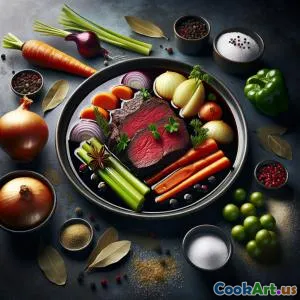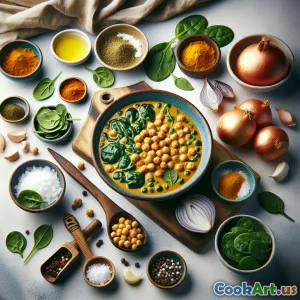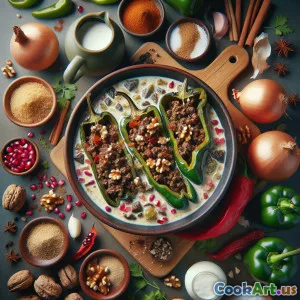
Traditional German Sauerbraten: A Tender Roast Delight
(0 Reviews)Ingredients
-
1.5 kilograms Beef roast
(Chuck roast is recommended for tenderness)
-
250 ml Red wine vinegar
(Can use white wine vinegar as an alternative)
-
1 large Onion
(Chopped into quarters)
-
2 medium Carrots
(Cut into chunks)
-
2 stalks Celery
(Cut into chunks)
-
2 leaves Bay leaves
(For flavoring the marinade)
-
1 tbsp Black peppercorns
(Crushed for marinade)
-
2 tbsp Sugar
(Brown sugar is preferred)
-
500 ml Beef broth
(For braising the meat)
-
1 tbsp Salt
(To taste)
(Chuck roast is recommended for tenderness)
(Can use white wine vinegar as an alternative)
(Chopped into quarters)
(Cut into chunks)
(Cut into chunks)
(For flavoring the marinade)
(Crushed for marinade)
(Brown sugar is preferred)
(For braising the meat)
(To taste)
Nutrition
- Servings: 6
- Serving Size: 1 plate (300g)
- Calories: 450 kcal
- Carbohydrates: 15 g
- Protein: 60 g
- Fat: 20 g
- Fiber: 2 g
- Sugar: 3 g
- Sodium: 800 mg
- Cholesterol: 90 mg
- Calcium: 50 mg
- Iron: 4.5 mg
Instructions
-
1 - Prepare Marinade:
In a large bowl, mix red wine vinegar, onion, carrots, celery, bay leaves, black peppercorns, and sugar.
-
2 - Marinate the Beef:
Submerge the beef roast in the marinade, cover, and refrigerate for 3 to 5 days, turning occasionally.
-
3 - Sear the Meat:
Remove the beef from the marinade and pat dry. Sear in a hot skillet with a little oil until browned on all sides.
-
4 - Prepare for Braising:
Transfer the seared beef to a Dutch oven and add the marinade along with beef broth.
-
5 - Braise the Beef:
Cover and cook in a preheated oven at 160°C (320°F) for about 3 hours or until tender.
-
6 - Serve:
Slice the beef and serve hot with gravy made from the cooking liquid.
In a large bowl, mix red wine vinegar, onion, carrots, celery, bay leaves, black peppercorns, and sugar.
Submerge the beef roast in the marinade, cover, and refrigerate for 3 to 5 days, turning occasionally.
Remove the beef from the marinade and pat dry. Sear in a hot skillet with a little oil until browned on all sides.
Transfer the seared beef to a Dutch oven and add the marinade along with beef broth.
Cover and cook in a preheated oven at 160°C (320°F) for about 3 hours or until tender.
Slice the beef and serve hot with gravy made from the cooking liquid.
More About: Traditional German Sauerbraten: A Tender Roast Delight
Sauerbraten: A German Culinary Tradition
Sauerbraten, often considered Germany's national dish, is a pot roast typically made from beef that is marinated before slow cooking. The origins of Sauerbraten can be traced back to the early 19th century, and it has become a beloved staple in German cuisine. The marinating process not only tenderizes the meat but also infuses it with a tangy flavor profile derived from the vinegar and spices used in the marinade.
Marination Process
The key to a successful Sauerbraten lies in the marination, which usually lasts from 3 days up to a week. This extended period allows the flavors to deeply penetrate the meat. The typical marinade includes a combination of vinegar, water, onions, and various spices. Some families have their own unique touch, adding ingredients like wine, carrots, or even ginger to enhance the flavor.
Cooking Method
After marination, the meat is seared for added flavor and then braised slowly. The slow cooking method allows the collagen in the tougher cuts of beef to break down, resulting in a tender and juicy roast. Traditionally, Sauerbraten is served with potato dumplings, red cabbage, or other seasonal vegetables, making it a hearty meal perfect for family gatherings or festive occasions.
Cultural Significance
Sauerbraten is more than just a meal; it represents German hospitality and tradition. It’s often enjoyed during family gatherings, holidays, and special occasions. The dish varies from region to region within Germany, with some areas using pork or horse meat as alternatives, showcasing the diversity of German gastronomy.
Tips & Notes
- Ensure you start the marination process a few days in advance for the best results.
- Feel free to adjust the spices according to your taste preference.
- The leftover meat can also be used in sandwiches or salads, making it a versatile dish that keeps on giving.

















